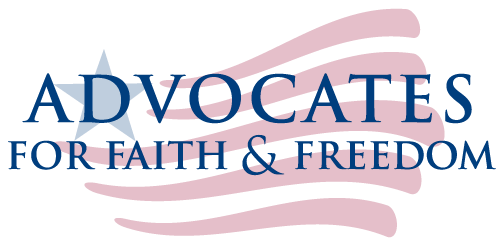THE FIRST AMENDMENT
From the time of the establishment of our nation, the founding fathers recognized the importance of Freedom of Religion. It was deemed so important, in fact, that it forms the First Amendment to our United States Constitution.
WHAT DOES THE FIRST AMENDMENT SAY?
“Congress shall make no law respecting an establishment of religion, or prohibiting the free exercise thereof; or abridging the freedom of speech, or of the press; or the right of the people peaceably to assemble, and to petition the Government for a redress of grievances.”
Do you notice what it does not say about religion? It does not say that the government should ensure freedom from religion. The First Amendment also does not mention any type of “separation of church and state” – nor is this phrase found anywhere else in our U.S. Constitution!
In our practice, we deal primarily with two different clauses that make up the religious freedom aspect of the First Amendment: the Establishment Clause and the Free Exercise Clause.
THE ESTABLISHMENT CLAUSE OF THE FIRST AMENDMENT
The Establishment Clause prohibits the government from establishing one religion for the nation, as well as favoring or disfavoring one religion over another in its dealings.
THE FREE EXERCISE CLAUSE OF THE FIRST AMENDMENT
The Free Exercise Clause concerns the statement that Congress may not prohibit the free exercise of an individual’s religion. This clause has encountered some different forms of interpretation in the Courts over the years, as the Court had to decide the extent of protection granted from this clause. Can people use this clause to defend their religious practice of polygamy, or even human sacrifice? This thought prompted the Supreme Court to decide, “Laws are made for the government of actions, and while they cannot interfere with mere religious beliefs and opinions, they may with practices.”
RELIGIOUS FREEDOM
The Free Exercise Clause is part of the First Amendment to the United States Constitution, which protects individuals' rights to practice their religion freely without interference from the government. This includes the right to hold religious beliefs, to worship, to pray, to proselytize, to engage in religious practices, and to adhere to religious customs and traditions.
Religious freedom is the one freedom that safeguards conscience, allows Americans to live out their faith, and makes the nation stronger. Though it is a fundamental right enshrined in the US Constitution, it is not always upheld in practice. Today, various factors put religious freedoms at risk, including discrimination in the workplace, censorship on social media platforms, and government-imposed restrictions during the pandemic. These violations of religious freedom impact individuals' ability to practice their beliefs freely and creates a chilling effect on religious expression. In this context, it's essential to understand the various ways religious freedoms are jeopardized and what can be done to protect this fundamental right.
Today, religious freedom is a regular topic in our courts. Big tech, employers, and landlords are trampling on the Free Exercise Clause by discriminating against individuals on the basis of their religious beliefs. Social media platforms and other tech companies have gone as far as taking down religious content or pages that they deem offensive or inappropriate, further exacerbating the situation. Similarly, some employers are showing the door to employees who cling to their deeply held religious beliefs, while others are refusing to hire them altogether. Landlords are showing bias against people of faith by denying them lease agreements, while at the same time catering to those who oppose biblical views.
Amid a COVID-19, many states and local governments brazenly flouted the constitutional right to religious freedom by imposing harsh restrictions on gatherings and services, leaving believers to question their freedom of worship. Similarly, despite religious and medical objections, mandatory vaccination policies have led to job losses for many Americans, in what has become an unprecedented overreach of governmental authority.
The Free Exercise Clause is an essential component of the First Amendment that protects individuals' rights to practice their religion freely. While violations of this clause have occurred in various contexts
As a republic founded on the principles of liberty and religious freedom, we must remain vigilant and steadfast in defending these fundamental rights. We will not waver in our resolve to protect and defend the rights of believers throughout our nation.
The First Amendment forms the basis for much of the work that we do here at Advocates for Faith and Freedom.
We believe in the freedom of religion and the protection of our individual liberties and rights as laid out in the U.S. Constitution and the First Amendment. You can learn more about the mission of our organization by clicking here.
